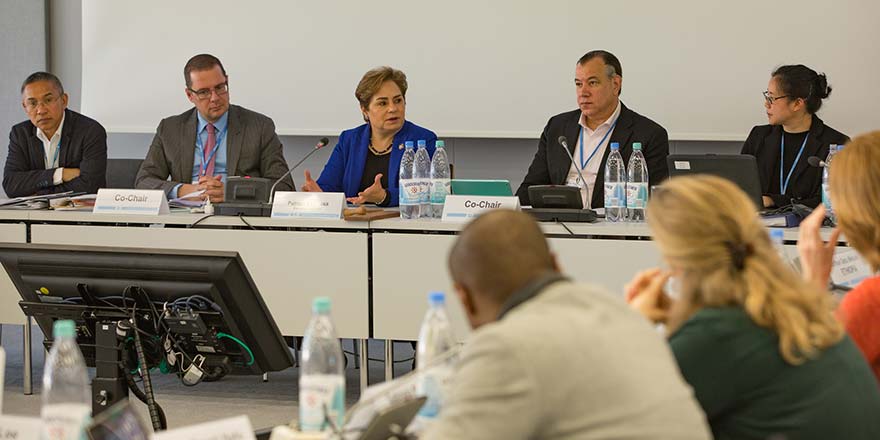
COVID-19 recovery and green growth: What is holding up implementation of the Paris Agreement?
21 July 2020In just a few weeks, the Covid-19 pandemic has led us to mobilise crisis response and best determine how we can live with the pandemic in the short term. The next stage, and one that we eagerly await, is how we can ignite new growth once vaccines and treatment solutions are available. This 3 stage cycle involves rescue, recovery and transformation to a new form of growth and development once the acute phase of the pandemic is over.
One thing that this crisis shows us is how fragile our economies actually are, from both an environmental perspective and from economic shock. Many commenters have equated the urgency of action to respond to the pandemic with the urgency of action to respond to the challenge of climate action. In my view the comparison is not so simple. At the time of writing, it is hard to forecast the full impact Covid-19 will have in the near term. Quick action led us to close our schools and many businesses in mid-March and Covid-19 caused a short-lived drop in CO2 emissions, perhaps as much as 20% globally. Our energy economists do expect emissions to rebound but not automatically. But economists are sometimes error prone: Bloomberg New Energy Finance observed that, even after many countries had implemented response plans, the Organisation for Economic Co-operation and Development (OECD) (on March 19) was still talking about global growth of 2.4% for 2020. Leading financial institutions such as Goldman Sachs, Morgan Stanley and Moody’s followed suit and were all still forecasting 0.9% to 1.5% growth.
Much attention is focusing on the EU Green Deal (Dec. 2019) organizing our recovery and greening our investment to build productive economies. We now have a great opportunity to build greener, environmentally friendly and more equitable societies. However, we must recognize the magnitude of the global collapse in terms of output, employment, consumption and demand. Rebuilding confidence in consumers and investors, while reflating our economy, is the first step.
The European political discourse is to place energy, transport and smart infrastructure at the heart of any longer-term stimulus. The European Commission's Green Deal chief, Frans Timmermans, said every euro spent on economic recovery measures after the COVID-19 crisis would be linked to the green and digital transitions. While investment in a ‘brown recovery’ is futile, significant investment in technologies such as electric vehicles and wind or solar plants is also not so realistic. While a complete system overhaul requires scaled up investment it also needs clearer market signals, plans for resilient infrastructure, and pricing support policies such as fast-tracking or buying down the closure of aging fossil fuel plants. We should begin with addressing our structural issues, such as electrical grid reinforcement, interconnection and market coupling, system flexibility and looking after our natural capital and environment. Once the foundations are in place we can move to enabling such transitions that include building electric road and rail, redesigning new cities, and wider efficiency. This does not mean reducing ambition nor promoting inaction in terms of climate change and biodiversity.
The recent Petersberg Climate Dialogue (2020) reinforced how the European Commission is on track to present, by September 2020, an impact assessed plan to raise the EU’s 2030 ambitions and cut greenhouse gas emissions by 50-55% compared to 1990 levels. Yet the rulebook structures are not in place: The rules around Paris Agreement implementation, the major challenges and barriers to be overcome by end 2020 are not agreed. Carbon accounting loopholes in terms of Paris implementation are not closed and countries can veto or block progress in the name of self-interest, retrenchment, economic advantage and geopolitics. Agreeing such an accounting rule book was the major challenge facing the UK Government and the Convention in terms of meeting its decarbonisation objectives at the COP26 in Glasgow. This is now postponed to November 2021 due to Covid19.
Explicitly, the reference case to this Paris rulebook lies in Article 6 of the Convention. This Article is only nine paragraphs and is the last piece of the Paris Agreement to be resolved. It sets the path to significantly raising climate ambition or lowering costs, while engaging the private sector and spreading finance, technology and expertise into new areas. By default, it is the core component that glues the Agreement ‘implementation’ together.
Article 6 refers to internally transferred mitigation actions, most commonly known as carbon markets or a sustainable development mechanism. In Ireland, we have recently become very familiar with carbon taxation as one of many market based and ‘command and control’ instruments that also include cap-and-trade, voluntary agreements with industry, subsidies, credits,-performance standards, fossil-fuel subsidy reductions. Such policies can be developed by any country seeking to be policy progressive on climate action that involves linking with policy systems where such permits and carbon allowances are internationally recognised. It also includes non-market approaches focusing on cross-border co-operation.
So let’s return to the idea of transformation to a new form of growth and development post Covid19. Individual countries can establish their own rules for carbon trading and connect these rules with policy systems without requiring any UN agreement language of increased ambition. Indeed, many progressive US states [1] have implemented such trading mechanisms and renewable energy portfolio standards. The accounting mechanisms and cross-border co-operation arrangements (Article 6.2) is where countries link actions in their carbon markets to their climate commitments (also known as Nationally Determined Contributions and National Adaptation Plans). Agreeing this Article will enable parties to fulfil their commitments and avoid double counting of greenhouse gas emissions.
Failure to agree on Article 6 will jeopardize the required system overhaul and makes the achievement of net-zero emissions and overall economic transformation very difficult. In the meantime countries should mobilise the private sector and develop their own carbon markets that are connected across different jurisdictions. This will deliver real action and, in doing so, will build productive and resilient economies.
Dr. Matthew Kennedy
Arup, Ireland and University College Cork (Tyndall National Institute).
Current Opinion Series (number 6) of the RIA Climate Change and Environmental Science Committee
(Blog post content and statements are proprietary to the authors. Each author represents only themself and their own opinion.)
Interview with Dr Matthew Kennedy
When did you join the RIA Climate Change and Environmental Science Committee?
I have been involved with the Climate Change and Environmental Science Committee since 2013
What is your area of research expertise and where are you based?
I have spent over 15 years investigating low carbon solutions in the energy sector. My specialization is mitigation technologies and, more recently, I collaborate with least developed countries to help them to transform their economies and societies through sustainable energy and transport measures that work best in their own jurisdictions.
What do you think is the single most pressing environmental issue facing Ireland?
The obvious issue is our transport system. It needs to transform into a modern, sustainable and effective one, curbing emissions growth while empowering the creation of new businesses. The hidden issue, and one that could have catastrophic impact, is our unwillingness to protect our own natural capital and environment.
In your opinion what are some of the most compelling solutions to this issue?
Cross-party action to invest in the development and implementation of policies that address our structural issues, and action that delivers resilient infrastructure accessible to all citizens.
What advice do you have for individuals to tackle this environmental issue?
Every individual is an agent of change. Each Irish citizen should be at the centre of our climate action and should demand change, inform discourse and drive action to achieve our successful transition.
References
[1] California Connecticut, Delaware, Maine, Maryland, Massachusetts, New Hampshire, New Jersey, New York, Rhode Island, and Vermont as part the RGGI (https://www.c2es.org/document/us-state-carbon-pricing-policies/). With the Renewable Portfolio Standards in place in 29 of 50 U.S. States.
Article image courtesy of UN via flickr.com/photos/unfccc



